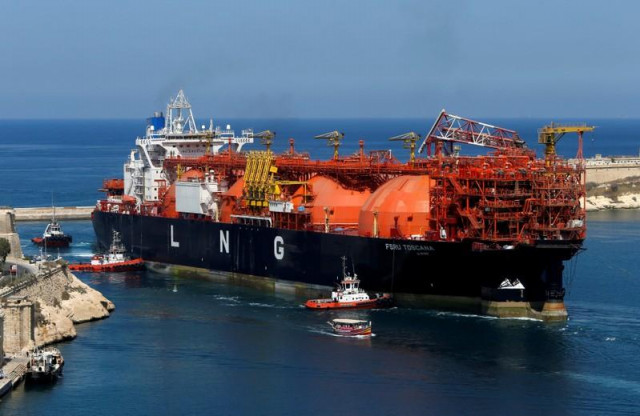Pakistan may not invoke force majeure in LNG deal
CCOE to consider cutting domestic gas production, maximising LNG consumption

Representational image. PHOTO: REUTERS
However, Pakistan plans to refrain from invoking the force majeure clause in the liquefied natural gas (LNG) deal with Qatar that will halt supplies but may also damage bilateral ties. It is instead considering a plan to cut domestic gas production and maximise imported gas consumption in power and fertiliser sectors.
The Cabinet Committee on Energy (CCOE) would consider that plan in its meeting scheduled to be held on Thursday.
The Petroleum Division has informed the cabinet body on energy that force majeure was a temporary excuse from obligations and required the party invoking the clause to act in a reasonable and prudent manner. The declaration of force majeure would be a challenge. It informed the CCOE that with the type of situation facing the LNG industry, due to oversupply and thin demand, there was little likelihood that force majeure would be accepted by LNG suppliers.
The Petroleum Division said force majeure should be non-discretionary, should be across the board and should not be specific to one contract only. It should entail closure of the entire port and not LNG terminals only. In such a situation, the LNG suppliers are expected to offer flexible conditions in order to avoid force majeure but these would be based on negotiations with the buyers in good faith.
In view of reduced gas demand due to the coronavirus-induced lockdown, the Petroleum Division has submitted some proposals to the CCOE in an effort to continue smooth operations of the LNG supply chain and avoid penalties.
It proposed to maximise LNG consumption in power and fertiliser sectors and curtail domestic gas production where contracts allowed and it was technically possible. The Petroleum Division said LNG importers should immediately take up the matter with the suppliers to seek a reduction in import volumes. However, the option may be exercised by all LNG importers including Pakistan State Oil (PSO) and Pakistan LNG Limited (PLL) regardless of the import volumes and prices.
At present, two LNG terminals are operational in the country. The first terminal is handling six cargoes each month which include five cargoes from Qatar.
However, the second LNG terminal is dealing with two cargoes only every month and the remaining LNG supplies are arranged through the invitation of tenders.
Long-term LNG contracts were secured to meet the demand for gas, mainly in the power sector. However, the power sector has not been able to consume LNG and the situation has become worse following the coronavirus outbreak in the country.
At present, severe challenges are bang faced in the LNG sector on account of alarming line packs and difficulty in timely receiving LNG cargoes.
This is attracting heavy demurrages on delayed discharge and if the cargo is not offloaded, it will potentially result in “take-or-pay” penalties - in case of either delay in receiving cargoes, partial offloading or cancelling cargoes. Such penalties may range from thousands to millions of dollars.
For example, penalties may range from $25-27 million, which is equal to the cost of one LNG cargo that could not be offloaded in the given time period.
In case of emergency, there are no straightforward solutions available. However, there are some options that may be used to avoid penalties, which include maximising supplies to power and fertiliser sectors. There is also the option of reducing LNG imports from the suppliers.
Invoking force majeure in the prevalent situation was not an option, the Petroleum Division said, adding that the force majeure provision available in the sale and purchase agreement between PSO and Qatargas was restricted to unloading facilities only and did not cover unexpected changes in the downstream gas market like reduced consumption and inability to pay.
Published in The Express Tribune, April 2nd, 2020.
Like Business on Facebook, follow @TribuneBiz on Twitter to stay informed and join in the conversation.



















COMMENTS
Comments are moderated and generally will be posted if they are on-topic and not abusive.
For more information, please see our Comments FAQ